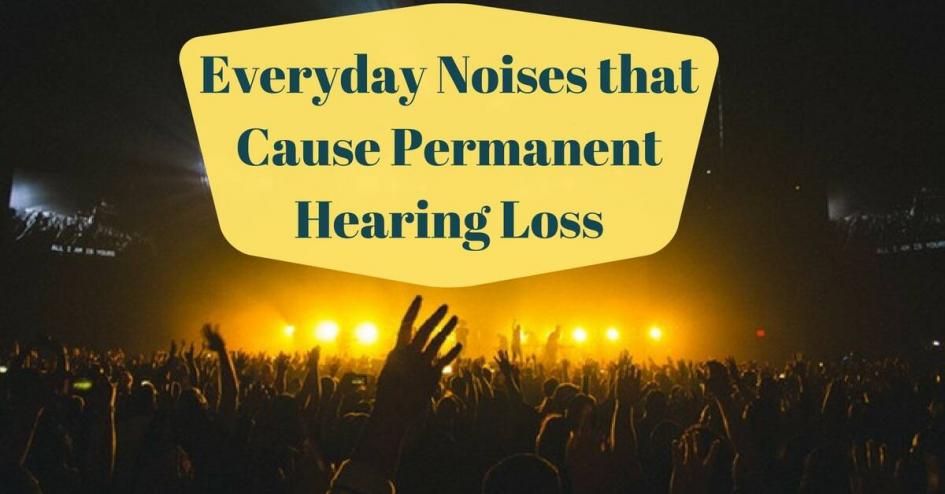
5 Everyday Noises that Cause Permanent Hearing Loss
Everyday Noises that Cause Permanent Hearing Loss
Hearing loss affects over 11 million people in the UK. It has a number of different reasons, and can happen to anyone of any age. One of the most common causes is noise-induced hearing loss (NIHL), which happens when a loud external noise damages a person’s inner ear. NIHL can happen immediately, after a one-off exposure to a loud sound, or it can happen gradually over time. It can affect one or both ears, and it can be temporary or permanent. Exposure to loud noise can also cause tinnitus, described as ringing or buzzing in the ears. Thankfully, NIHL is one of the few kinds of hearing loss that can be prevented.
Why are loud sounds dangerous?
We all encounter noisy environments on a regular basis, from city traffic and construction sites to firework displays. How harmful a noise is depends on how loud it is, how long you are exposed to it for and how far from the source of sound you are.
Sound is measured in decibels (dB). The louder a noise, the higher its decibel value is. An average conversation takes place at around 60dB, while the humming of a refrigerator measures around 45dB. A train whistle, meanwhile, can be as loud as 95dB. Our ears can tolerate sounds up to 75dB for prolonged amounts of time, without risking hearing loss.
The human ear is extremely delicate. Loud noise can kill the sensitive hair cells in the inner ear, and in some cases even perforate or rupture the eardrum or small surrounding bones.
These structures are all crucial for transmitting sound from the ear to the brain. Once they are damaged, permanent hearing loss may occur.
What noises are harmful?
Experts recommend that we should avoid prolonged exposure to sounds above 75dB. A good rule of thumb is to listen to your ears – if a noise is too loud, too close or goes on for too long, it is probably harmful.
- Some sudden and extreme sounds at close range, such as a gunshot or explosion, can cause immediate and permanent damage to the ear.
- Unprotected exposure to sounds in the 110 - 140dB range for 1 minute or more can result in permanent hearing loss. This includes rock concerts, jet engines, sirens, firecrackers and firearms, explosions, chainsaws and even MP3 players at maximum volume.
- Regular or continuous exposure to sounds in the range of 85 – 100dB can also cause permanent hearing loss. Sounds in this range include heavy city traffic, rubbish trucks, motorcycles and jackhammers.
How to prevent against NIHL
Some sounds may be unavoidable if they take you by surprise. However in most cases, you can anticipate a noisy situation and take steps to protect yourself.
- If you regularly work with industrial machinery, power tools or heavy vehicles, you should wear hearing protectors such as earplugs or earmuffs. Your employer is legally obliged to provide you with hearing protection if you workplace noise exceeds 85dB. The Buy Quiet campaign encourages employers to invest in quieter machinery to protect workers’ hearing.
- If you work with music, wear hearing protectors and try to keep loud noise to a minimum when practicing.
- If you are attending an event that will feature loud noises, such as a concert or fireworks display, carry earplugs with you and position yourself away from the source of noise. Remember that it’s not just rock concerts that can be loud – the peak of an orchestral symphony can reach 120 – 137dB.
- Do not listen to music loudly for extended periods of time, especially when using earphones and headphones. The rise in popularity of personal music devices has left many young people at risk of NIHL. Many MP3 players feature an optional ‘noise limiter’, accessible in the device’s menu. This setting limits the maximum volume of the player - a useful option if you are concerned about young relatives listening to music too loudly.
- Remember: if a noise is too loud, unpleasant or even painful, move away from the source immediately.
What’s the next step?
If you have been exposed to loud noise, or think you may have a hearing loss, we recommend that you have a hearing test as soon as possible. To make an appointment, give us a call on 0131 220 1220, or pop in to one of our centres – our specialists will be happy to help!
House of Hearing UK
Edinburgh | Galashiels | Perth | St Andrews
0131 220 1220
Our Clinics
All House of Hearing clinics are in town centre locations and accessible to public transport and parking. Home visits also available if mobility is an issue.


.png)
.png)
.png)

.png)
